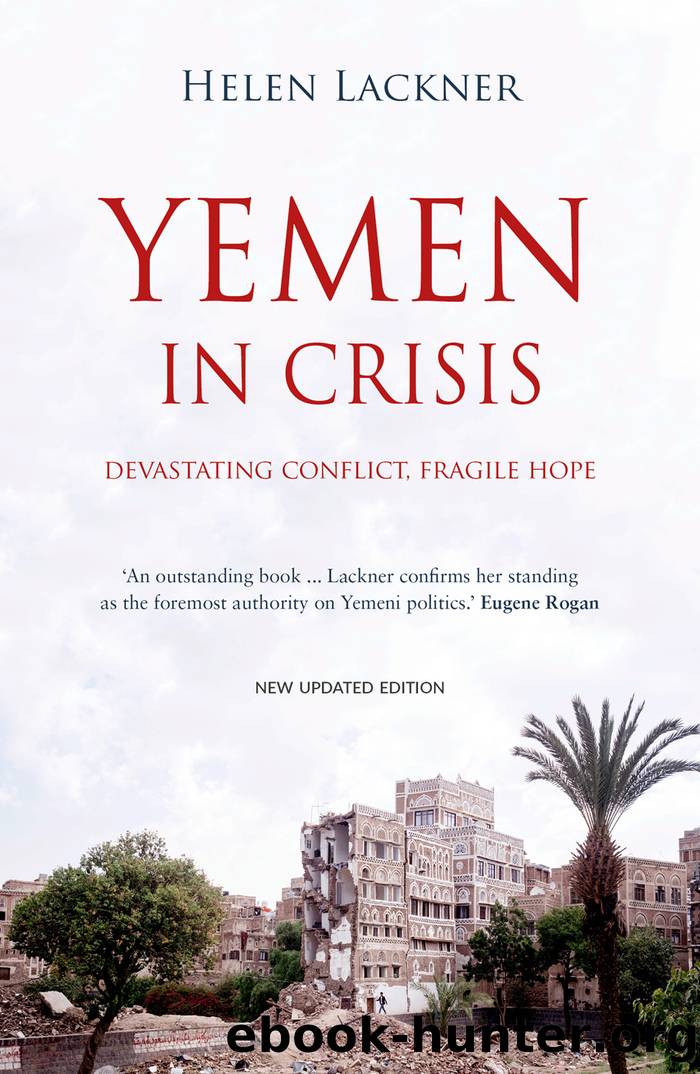Yemen in Crisis by Lackner Helen;

Author:Lackner, Helen;
Language: eng
Format: epub
Publisher: Saqi
Marginalisation of the South
Perceptions of marginalisation and bitterness spread throughout the Southern governorates, particularly after the 1994 war. Only a few groups benefited directly from the new regime: some returnees from exile who participated in, or initiated, businesses with the Sanaâani elite, others who received land and properties, some emigrants who invested in real estate, and the few who managed to integrate into these structures. But the vast majority of professionals, farmers, other rural and urban people, and in particular the elites from the socialist period, all considered that they were being marginalised: that jobs were given to Northerners rather than to them, that all regulations and rules were set in Sanaâa for the benefit of Northerners, and that their living conditions continued to worsen, with no prospect of improvements.
These perceptions were felt particularly acutely in Aden and in the south-western highlands. Hadramaut was less affected, partly because its population had been less committed to the socialist regime, despite the fact that some of the highest ranking PDRY politicians were Hadrami; but most importantly because many Hadramis benefited more from the new regime. This was thanks to their large diaspora based in Saudi Arabia, which promptly started investing in various enterprises in the governorate and consequently created employment for local people. They also financed some infrastructure as well as charitable organisations. The only group which suffered systematically from the new regime was that of the lower-status Hadrami fellaheen (cultivating group not entitled to own land) who lost their lands to the previous owners or others.4 Many of them either returned to their earlier situation as sharecroppers or alternatively found other casual work locally. Again, diaspora connections helped: some of the leading and wealthiest Saudi-Hadrami businessmen are of low-status origins and helped others to obtain visas to Saudi Arabia.
Despite its official status as the economic capital, Aden lost out in the industrial sector and its professionals suffered discrimination, either because jobs moved to Sanaâa or because they were unable to organise the contacts and networks that they needed in either location. People from the western governorates (Lahej, al-Dhalaâ, Abyan and Shabwa) had limited income from small holder agriculture, and there were few large agricultural projects. Large numbers of their men were former military who became the core of the Southern separatist movement a decade later. In any case, most recruitment to the security/military forces was limited to men from certain areas surrounding Salehâs own home in Sanhan, who benefited from top quality training and equipment. By contrast, other military personnel were exploited and deprived of their fair share of food and equipment, and their allocations disappeared into the pockets (or foreign bank accounts) of their commanding officers.
While there is no doubt that the situation in the Southern governorates deteriorated and its people lost many of the advantages of the socialist regime, what basically happened is that they were brought to the level of living and working conditions which had prevailed throughout the YAR prior to unification. In other words, what people
Download
This site does not store any files on its server. We only index and link to content provided by other sites. Please contact the content providers to delete copyright contents if any and email us, we'll remove relevant links or contents immediately.
| Bahrain | Egypt |
| Iran | Iraq |
| Israel & Palestine | Jordan |
| Kuwait | Lebanon |
| Oman | Qatar |
| Saudi Arabia | Syria |
| Turkey | United Arab Emirates |
| Yemen |
Empire of the Sikhs by Patwant Singh(22763)
The Wind in My Hair by Masih Alinejad(4839)
The Templars by Dan Jones(4557)
Rise and Kill First by Ronen Bergman(4545)
The Rape of Nanking by Iris Chang(4022)
12 Strong by Doug Stanton(3419)
Blood and Sand by Alex Von Tunzelmann(3055)
The History of Jihad: From Muhammad to ISIS by Spencer Robert(2504)
Babylon's Ark by Lawrence Anthony(2428)
The Turkish Psychedelic Explosion by Daniel Spicer(2245)
No Room for Small Dreams by Shimon Peres(2235)
Gideon's Spies: The Secret History of the Mossad by Gordon Thomas(2233)
Inside the Middle East by Avi Melamed(2230)
Arabs by Eugene Rogan(2193)
The First Muslim The Story of Muhammad by Lesley Hazleton(2154)
Bus on Jaffa Road by Mike Kelly(2035)
Come, Tell Me How You Live by Mallowan Agatha Christie(2025)
Kabul 1841-42: Battle Story by Edmund Yorke(1921)
1453 by Roger Crowley(1879)
